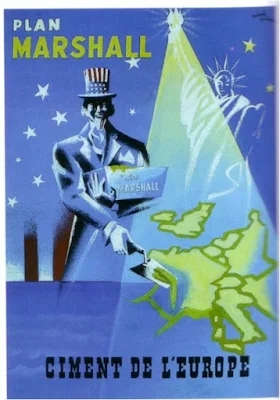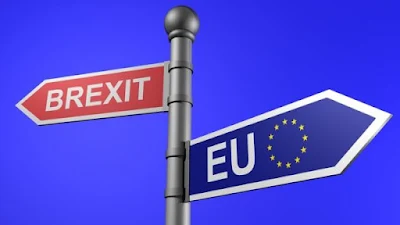 |
| A Marshall Plan poster |
The new PM of the UK has announced that the formal process of Brexit--Britain's exit from the European Union-- will start by the end of March. A major country leaving the EU has never happened, and so even with these past months of commentary and debate, this is a traumatic moment, and a very disturbing one.
The UK is already seeing the prospect of adverse economic consequences, and there are fears for the European Union itself. The latter is especially troubling if you know the history.
At the end of World War II Europe was in shambles. Major cities were clotted with rubble, there was widespread hunger and homelessness. Things didn't improve fast enough in the later 1940s and nations were near collapse, with the Soviet Union ready to pick up the pieces.
Then came the Marshall Plan, which brought billions in US aid and financing but with meaningful direction from European governments. Partly to make the Marshall Plan work, and partly to help strengthen Europe in the long term, the US used its leverage to encourage economic integration across national borders.
The breakthrough came when France and West Germany shared their coal and steel industries. The first steps to the European Common Market and then to the European Union were taken. Europe returned to pre-war levels of prosperity and exceeded them.
Eventually, economic integration, common currency and free movement of people and goods had cultural and political effects. Apart from keeping themselves free of Soviet domination, the countries of this continent--where two devastating world wars began, where hundreds of years of wars were fought--became unified to an extent that warfare among them was almost impossible.
But from the beginning, England resisted this integration. After a couple of centuries as an imperial power, England had much stronger economic relationships with its former colonies--the Commonwealth--than it did with Europe. But gradually and inevitably, that changed.
From this remove, there seems no broad economic reasons for the UK to leave the EU. In terms of governance, the argument has been made that the EU is too bureaucratic and not sufficiently responsive, or democratic. President Obama alluded to this at the UN: "In Europe, a well-intentioned Brussels often became too isolated from the normal push and pull of national politics. Too often, in capitals, decision-makers have forgotten that democracy needs to be driven by civic engagement from the bottom up, not governance by experts from the top down." In fact, while US commentators tended to view this address only through the lens of US politics, much of it applies directly to the dilemma of Europe and Brexit, including underfunded institutions and income inequality.
That's particularly true of its central theme of the push-pull of global integration vs. renewed national, ethnic, tribal, religious identity and resulting hostility towards the Others.
This is an undeniable part of Brexit. To an extent still debated, it was fueled by anti-immigrant rhetoric and sentiment. Its passage apparently unleashed more violence against immigrant workers, particularly Polish workers, including one death.
Reactionary sentiment is what shocked the UK and disturbs the US. Voters for leaving the EU also were almost twice as likely to deny the climate crisis, and so on. The fears are made explicit with the news that one of the main Brexit advocates who is also a Brit version of an alt.right politician, is hurrying over the Atlantic to coach Donald Trump for his next debate.
Even in victory the hard reactionaries are pushing for a Hard Brexit--an immediate exit without negotiation with the EU, or hope of negotiating continuing if changed relations. Update: In an interview reported Sunday, PM May specifically supported limiting immigration as part of Brexit, regardless of its economic effect in free trade with Europe. So she is apparently siding with the reactionaries.
While the UK still seems in a dizzy denial, seemingly without adequate leadership anywhere--certainly not of the quality that got the UK and Europe through the postwar years.
And many in the US look at this and know that it can happen here, with nightmares of waking up November 9 feeling like a lot of Brits did when Brexit passed, despite utter disbelief (including by pollsters) that it would.














No comments:
Post a Comment